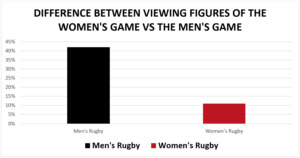UK women’s rugby players and their clubs took part in a social media blackout over the early May Bank Holiday weekend to show solidarity against online abuse and harassment.

Women’s rugby’s is one of the fastest-growing sports in the UK, but the increased attention has also amplified the amount of online abuse – often of a sexist and racist nature – that these top-flight athletes face.
Despite the increase in popularity, the sport remains underdeveloped due to a lack of funding and a small fan base. This means some players have to work full-time jobs while also training professionally.
Kyara Martin is a winger for Bristol Bears, a club in the Allianz Premiership 15’s. The competition, which is comparable to the Premiership Rugby, features the best teams in England.
Talking to me for Rising East, Kyara goffered a fascinating insight into the life of a women’s rugby player and the challenges that women face: “There’s that awkward phase … where you have to train like a professional athlete but not be paid like one.”
Watch the full interview here:
A recent YouGov survey reveals attitudes and statistics that account for many of the problems currently facing the women’s game, so we have created our own infographics below, in order to show some of the more important findings.
The good news is that most people want the women’s game on TV. But there is a sting in the tail.

The study found that the gap in viewing figures for the men’s and women’s game was wider than in any other sport.

This disparity has a lot to do with the high percentage of people who think that that men’s rugby is played at a higher level than women’s.

The pub is a sports fans’ haven, so we asked the punters what they thought of women’s rugby. One began his explanation as to why he doesn’t watch by saying, “I don’t know I’m just pretty misogynistic.”
Listen to all the pub punters opinions here:
Most of those we spoke to said that the quality of women’s rugby was poor and they showed general lack of interest. This mindset currently stands in the way of women’s rugby being accepted as a top-flight sport.
In January, when Sky Sports broke the news that the women’s Six Nations would be postponed until April, most of the comments at first were very negative, with many saying they didn’t care or that it was good that the tournament was cancelled. However, after a media campaign by sportswoman, the posts were replaced by positive support and an outpouring of #icare.


Women’s rugby is competitive, entertaining and deserves respect. Most importantly it has huge potential. As it continues to grow and become more professionalised so too should the support it garners.
Find your local women’s rugby team and give the players your support, they deserve it.



